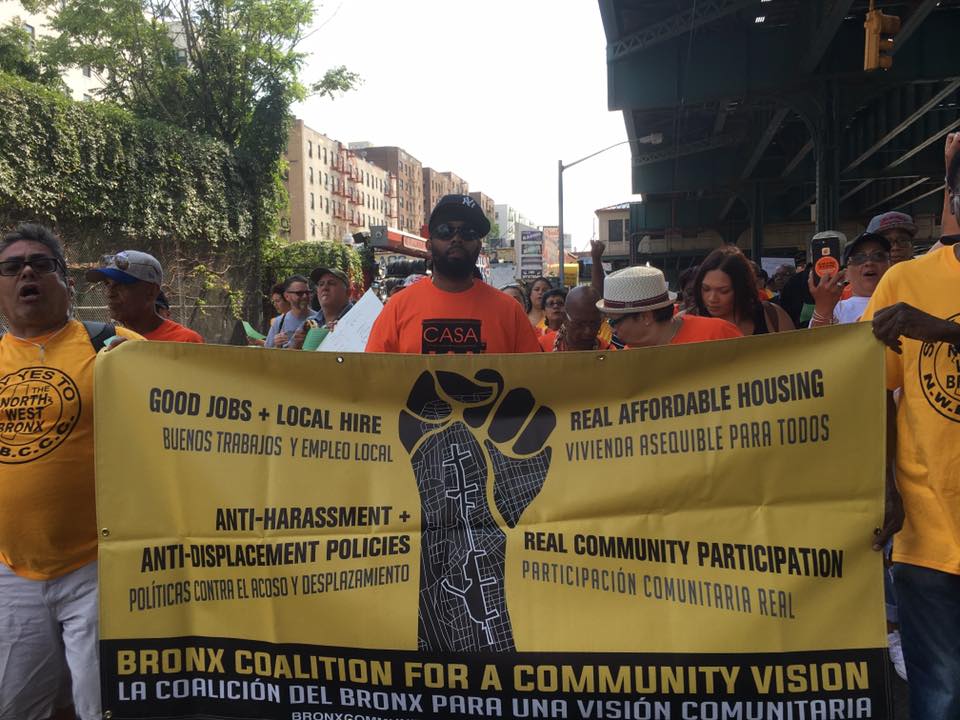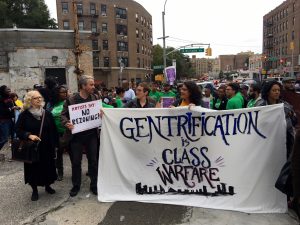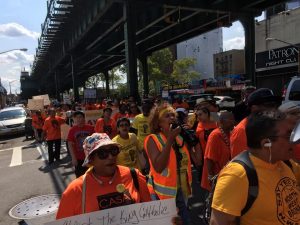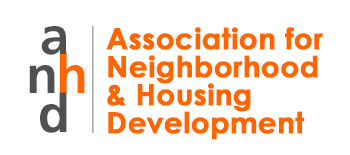Community Perspective: Why Folks Are Saying No to the Jerome Avenue Rezoning
Bronx Residents See Realities that the City Won’t Acknowledge

The proposed rezoning of Jerome Avenue takes a step forward with the City Planning Commission hearing taking place today. This hearing comes as community residents continue to express serious concerns that their voices have not been truly heard in the rezoning process or their feedback meaningfully incorporated by the City.
As ANHD’s Technical Assistance Coordinator to neighborhoods facing major rezonings, I spend a lot of time at local Department of City Planning hearings and at local community-led planning meetings. Part of my job is to translate the obtuse language of professional zoning-speak, but mostly my job is to listen to what the community is saying and help them to powerfully bring that perspective to the zoning process. There is often a lot of distance between what the community is saying and what the City and the Department of City Planning seems to be hearing. In light of this, it’ important to understand how many Bronx residents see the Jerome Avenue rezoning and to highlight the fundamental difference between their perspective and the City’s.
Here is what I have heard in my time working with the Bronx Coalition for a Community Vision, from residents at meetings, marches and rallies asking the City to listen to the voices of the community; this is what I have heard at Community Board and Borough President hearings – both in the testimony that residents have delivered, and in the back of the room and in the hallways, in the discussions that residents are having among themselves.
 At its root, the community’s concern is this: there’s a difference between a housing plan and an affordable housing plan. What the City is proposing for Jerome Avenue is presented as an affordable housing plan, but a clear eyed assessment of its outcomes shows this isn’t nearly as true as it needs to be. The clearest impact of the rezoning will be to increase the total amount of housing that can be built in the neighborhood, rather than to specifically increase the amount of affordable housing available. Yes, this new housing encouraged by the rezoning will include a certain percentage of affordable units through Mandatory Inclusionary Housing (MIH). But these can only come in conjunction with market-rate units – about 2 to 4 new market rate units for every 1 affordable unit produced. The community understands this, and sees the proposed rezoning of Jerome as, more accurately, a market rate housing plan.
At its root, the community’s concern is this: there’s a difference between a housing plan and an affordable housing plan. What the City is proposing for Jerome Avenue is presented as an affordable housing plan, but a clear eyed assessment of its outcomes shows this isn’t nearly as true as it needs to be. The clearest impact of the rezoning will be to increase the total amount of housing that can be built in the neighborhood, rather than to specifically increase the amount of affordable housing available. Yes, this new housing encouraged by the rezoning will include a certain percentage of affordable units through Mandatory Inclusionary Housing (MIH). But these can only come in conjunction with market-rate units – about 2 to 4 new market rate units for every 1 affordable unit produced. The community understands this, and sees the proposed rezoning of Jerome as, more accurately, a market rate housing plan.
This is the fundamental concern of community residents and one they feel the City has not properly addressed. Instead of acknowledging this distinction between new development and affordable units, the community continues to hear the City represent the Jerome rezoning, in their discussions and presentations, as being primarily an affordable housing plan.
The creation of affordable housing is vitally important for the neighborhoods surrounding Jerome Avenue, but the way in which it’s done matters profoundly to community residents. The rezoning represents a marked change in land use – from primarily manufacturing to high density residential districts – opening up the possibility of a massive amount of new residential housing where it’s currently not allowed. This type of wholesale changing of land use has the potential to significantly increase land values and with it the housing market around Jerome Avenue, creating waves of secondary displacement effects as higher-income renters move into the neighborhood. It’s a story that local residents have seen played out countless times throughout the city. It’s a story that Jerome residents are well aware of, and in many cases have experienced themselves before moving to the Bronx. This is why they are pushing back against the City’s plans.

To address these concerns, the City says that the new affordable units produced under MIH will mitigate the displacement effects of the rezoning. But here are two key issues that local residents understand and that the City seems to ignore: 1) the rent levels set for MIH units are already higher than most current residents can afford to pay, and 2) there’s absolutely no guarantee that MIH units will be held for households that are displaced. The City also says that displacement won’t be an issue for Jerome, since this is a neighborhood where subsidy is generally needed for new construction, a trend the City believes will continue after the rezoning. But building deeply affordable units is contingent on private developers taking City subsidy, and as the market changes post-rezoning, there is no guarantee that developers will continue to do so. The only guaranteed affordable housing this rezoning would provide are MIH units, comprising some 20%-30% of the total units built. Considered all together then, the tradeoff of MIH units for the possibility of significantly more market-rate simply isn’t worth it for many Jerome residents.
Meanwhile, the City has actually been doing a good job of subsidizing new construction at affordability levels that meet the neighborhood’s current need, with over a third of Housing New York units in the Jerome vicinity going to Extremely Low Income households. This is a crucial need being served, and it makes a difference with local residents. The City should strongly consider why it wants to risk changing this dynamic with the proposed rezoning and all the ramifications it brings.
Residents of Jerome Avenue understand these risks and complexities, and this is why they’re pushing back. They understand that a true affordable housing plan, especially for an area like Jerome Avenue that is threatened by market-rate development, would need to result in more affordable housing than market rate development. This is what the City and the Department of City Planning need to hear: that the anger and opposition being expressed by the community is not coming from ignorance, or NIMBYism, or “fear of change,” but from a deep understanding, rooted in experience, that a housing plan and an affordable housing plan are two very different things.
Christopher Walters, ANHD’s Rezoning Technical Assistance Coordinator
 ANHD 2016 Building the Community Development Movement
ANHD 2016 Building the Community Development Movement
